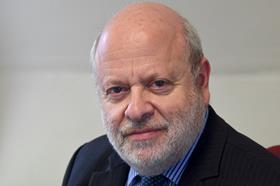We must not take what happens – or indeed dies in silence - in our Ministry of Justice as indicative of what happens in the wider world, and certainly not as being normal. We should instead focus on the many developments elsewhere, to maintain perspective and move with the times.

As you may know, the Ministry of Justice was renamed in the recent government reshuffle. It is now the Ministry of High Standards and Professionalism. The deputy prime minister, lord chancellor and secretary of state for high standards and professionalism has taken steps to ensure that the graphs framed on the ministry walls showing court delays, legal aid payment rates and the state of court buildings have all been moved into a precise row, but turned upside down, so that each curve in the row shows a sharp upswing to success, like a synchronised dancing display.
A single copy of the Bill of No Rights Bill is kept clean and dusted in the lord chancellor’s office, next to the telephone. When the phone rings, it will signal that someone somewhere supports his parliamentary initiative. Yet the phone has not rung for months. The lord chancellor drums his fingers all day on the empty desk, with three pens lined up neatly on the white blotter.
He has even replaced the throbbing vein in his forehead. His servant, Igor, keeps a set of throbbing veins in a safe in the basement, suitable for all occasions. Today Igor laid out one on his bed in pink dayglo, especially for Valentine’s Day and to attract some cards.
When the silence grows too oppressive, he practises slamming the door, again and again, louder and louder, until his private office staff cower. It is not aimed at them, though. Calm down, snowflakes! He is practising for the next time the president of the Law Society dares to show her face at the doorway. Legal aid pay rates need to rise – ha, he’ll show her what he thinks of that.
In the wider world, winds are blowing, and new ideas are taking shape. I will speak only about initiatives which have crossed my desk this week in the justice area, not necessarily connected to the ministry’s work, but to show that elsewhere things are moving. Ah, for some fresh air! These particular developments are in the area of corporate reporting, and professional well-being.
For the corporate world, the EU has just added to the environmental, social and governance (ESG) reporting requirements that already exist in this country, with the adoption last month of its Corporate Sustainability Reporting Directive (CSRD). This modernises and strengthens the rules about the social and environmental information that companies must report. A broader set of large companies, as well as listed SMEs, will now be required to report on sustainability – approximately 50,000 companies in all. Some corporate clients in the UK will be affected.
Reporting on climate and other environmental concerns is spreading fast. The CSRD adds to an existing alphabet soup of corporate reporting requirements in the UK, to tax solicitors working in the field. Among them are the following:
- the UK Streamlined Energy and Carbon Reporting (SECR) regime;
- the Companies (Strategic Report) (Climate-related Financial Disclosure) Regulations 2022 and the Limited Liability Partnerships (Climate-related Financial Disclosure) Regulations 2022;
- Climate-related financial disclosures for companies (CRFD); and
- the sustainability disclosure standards produced by the International Sustainability Standards Board (ISSB).
A new set of initials will soon be added, when the EU adopts its related directive on corporate sustainability due diligence (CSDDD), to foster sustainable and responsible corporate behaviour throughout global value chains. The UK government has signalled that it will not replicate this directive because our own rules in the area are already extensive.
If even reading this blizzard of initials has affected your wellbeing, then the International Bar Association (IBA) has something for you. Work-related stress and mental health at work are grave matters which the IBA rightly considers a serious challenge for our profession. Numerous bars around the world have launched similar initiatives, including the Law Society.
This week, the IBA launched a Professional Wellbeing Commission. It has various objectives, such as promoting the importance of wellbeing as a core issue and priority for the global legal profession; sharing policies and working practices to help promote positive and sustainable wellbeing within the profession; and making recommendations to change or modify the practical and regulatory environment of the legal profession at all levels, where possible.
It will also focus on the stigma around mental health, which is key to unlocking assistance. Being the IBA, it will additionally concentrate on the way different cultures approach the issue.
However, back in the Ministry of High Standards and Professionalism, silence still reigns. Papers are shuffled into exact piles equally spaced from each other. The clock ticks.
Jonathan Goldsmith is Law Society Council member for EU & International, chair of the Law Society’s Policy & Regulatory Affairs Committee and a member of its board. All views expressed are personal and are not made in his capacity as a Law Society Council member, nor on behalf of the Law Society































2 Readers' comments